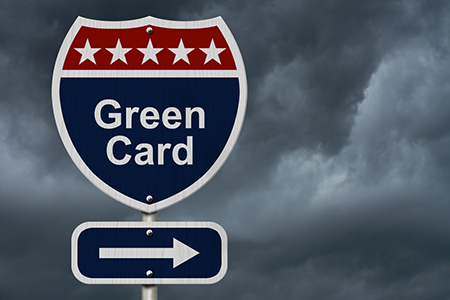Can I Apply for a Green Card While in the U.S.A.?

Is it possible to apply for a Green Card while in the USA?
The question of whether you can stay in the United States while you apply for a Green Card (lawful permanent residence) is a more complex question than it sounds. Some background is necessary to answer the question.
An application for lawful permanent residence is the last step in a multi-step process. The form number for this type of application is I-485, so often people will use “I-485 application” interchangeably with “Green Card application,” “adjustment application,” or “application for lawful permanent residence.” All four phrases refer to the final process of becoming a lawful permanent resident in the United States.
The number of steps involved and the length of time it takes to get to this step change dramatically depending on the person’s nationality and on whether the case is an employment-based case, family-based case, or humanitarian-based case. It can take several years and many different filings with the United States government to get to this point of actually filing the I-485 application with USCIS. The steps leading up to filing a Green Card applications do not let a person stay in the United States lawfully. People wanting to live or work in the United States while completing the first several steps must maintain lawful nonimmigrant status without any status violations or overstays.
To keep this relatively simple, this blog only talks about the final step of filing the I-485.
What is the rule regarding applying for the Green Card while in the United States?
The general rule is that a person must be in the United States in lawful nonimmigrant status in order to file a Green Card application while in the United States. In other words, if a person enters in the United States without a visa, overstays a nonimmigrant visa, or violates the terms of admission, that person cannot apply for lawful permanent residence while in the United States. For most people, any violation of status or unlawful presence in the United States means that they cannot apply for the Green Card in the United States. They will have to return to their home countries and apply for immigrant visas in order to obtain lawful permanent residence.
Are there any exceptions to the general rule?
There are exceptions. Most people remember the exceptions and think the exceptions are the general rule. Fifteen years ago, a common exception was Section 245(i) of the Immigration and Nationality Act. That law expired on April 30, 2001, so few people are grandfathered under that law. Today, the most common exceptions are restricted to some family members of United States citizens and to some employees. These are very narrow exceptions, so a Green Card applicant should consult with a qualified immigration lawyer before relying on one of them.
A spouse, a parent, or a child under the age of twenty one can file an adjustment application while in the United States if they entered the United States lawfully on certain types of visas. Some types of visas do not allow a person to qualify for this exception. Also, sometimes relying on this exception opens a risk of being charged with fraud and then having the Green Card application denied.
Some beneficiaries of employment-based immigration cases can file the I-485 in the United States if they have less than 180 days of status violations (including overstays and failures to maintain lawful status). This is a very strict exception to the general rule.
Can I stay in the United States while the Green Card application is pending?
Once an I-485 is properly filed with USCIS, a person can stay in the United States while the Green Card application is pending, even if the person’s original nonimmigrant status expires. The applicant will not be able to work in the United States or travel outside the United States before receiving interim employment and travel authorization. Working without authorization or leaving the United States without authorization can result in the denial of the Green Card application.
Is there another way to apply for lawful permanent residence?
People who are outside the United States complete the final step at the United States consulate in their home countries. This step is called consular processing or immigrant visa processing. In this situation, the person receives an immigrant visa stamped in her passport and is admitted to the United States as a lawful permanent resident the first time she travels to the United States.
However, if the person has a history of immigration law violations, including being unlawfully present in the United States for more than 180 days, the consulate will not issue the immigrant visa and instead find the person to be inadmissible to the United States.
Conclusion
Many people prefer to complete the immigration process and receive the Green Card while in the United States. However, getting the green card is neither automatic nor guaranteed. People applying for the Green Card must continue to follow United States immigration rules during the entire process, including the final I-485 application. Violations of immigration law can result in the denial of an application for lawful permanent residence and even in a temporary or permanent bar to the United States.

